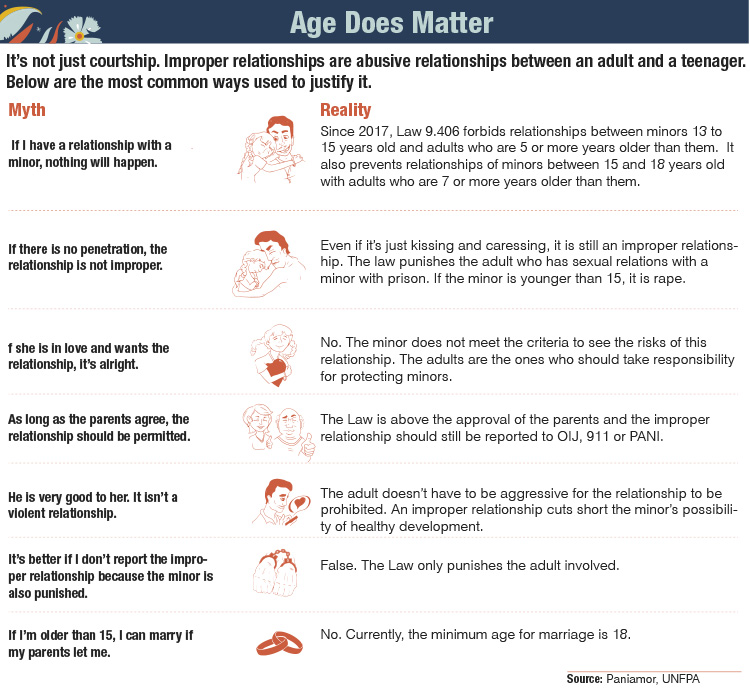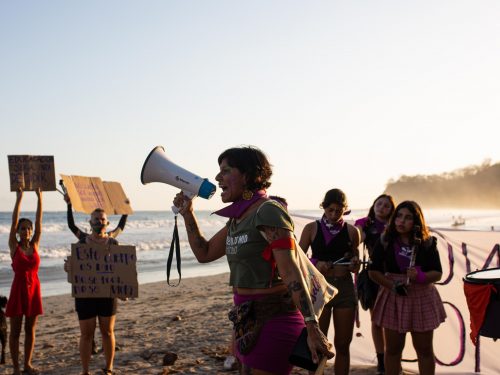
It is August 4, 1968. Seventeen-year-old Flor Jimenez is getting ready to leave her parents’ house, in Cañas, Guanacaste, and move in with a man 14 years older than her. She calls him “her boyfriend.”
She is taking a few things with her in a plastic bag, to not say that she isn’t taking anything. A blouse, a pair of pants and a pair of shoes. Her mother repeats again and again, “What do you see in that old man?,” but that does not stop her. Her dad, wrapped up in his own anger, can’t get her to give up going either.
It only took Enrique (fictitious name for this story) four months of conquest to get to this moment. A trip to the movie theater was the icing on the cake.
51 years ago, Flor, without placing blame, helped lay the foundations of a culture that still sees relationships of minors with adults as something normal and correct, but as of two years ago, since 2017, Costa Rican legislation punishes it more forcefully as a type of gender violence.
Law Number 9.406 stipulates a punishment of imprisonment for relationships that, due to their big age difference, can turn into a bond of power and abuse. For example, if the victim is between 13 and 15 years old and the adult is five or more years older, the adult runs the risk of going to jail.

It Is Not a Courtship
During a phone call, Flor tells me that for those years, she only “had a head to think about him,” and that “that thinking ended up getting her into big problems.”
That simple description is almost the same as the one used to explain what an improper relationship is by the coordinator of the AMELIA project (Adolescents, Women, Empowered, Free, Independent and Autonomous) from the Paniamor Foundation, Kattia Rojas.
According to the specialist, relationships like that of Flor and Enrique are a type of violence that make minors experience situations that are not appropriate for their stage of childhood and adolescence.
It is not a courtship. It is an unequal relationship of power. The adult is the only one responsible, and it is women who are mainly affected by these dependent relationships,”said Rojas.
Flor did not finish high school. She was in her third year when Enrique took her out of her house, and she never took up her studies again.
After 30 minutes on the phone, she wants to tell me another detail about her life but can’t find the words. After babbling for a few seconds, she said, “Well, you know, I had not fooled around before going with him.”
Flor was referring to Enrique being his first sexual partner. A year after he took her from her home, she was preparing to give birth to her first daughter.
The psychologist at the Creciendo Juntos (Growing Together) clinic, Katherine Chavarria, who sees children and adolescents in the canton of Carrillo, recognizes that one of the consequences of an improper relationship is precisely that the minor’s sexual process is accelerated and, in addition, she is exposed to early pregnancy.
Data considered in the 2018 Survey of Women, Children and Adolescents (EMNA for the Spanish abbreviation), revealed that in Guanacaste, about 10% of the women between 15 and 24 years of age surveyed said they had had sexual relations before the age of 15 with a man 10 or more years older than them.
At the national level, precise statistics are not available to determine how many women were or are in an improper relationship, or how many births are the result of this kind of relationship. However, the Paniamor Foundation and the National Children’s Trust (PANI) use some approximate data to understand and evaluate the problem.
One way is correlating the relationship between the number of teenage mothers compared to the number of fathers in the same age group. According to an analysis by The Voice of Guanacaste with data from the National Institute of Statistics and Censuses, in the province, 1.247 women under the age of 15 became mothers in the last decade. Only 21 fathers was reported in that same age range.
The initiation of sexual relations of our teenage girls is with older men, not with peers. And we see that pregnancies are also with older people. It is a serious situation,” the PANI official commented.
After an hour on the phone, between moments of laughter followed by silences, Flor tells me the following expression three times: “Now the one on top of the she-donkey has to tame it.” For her, it is a phrase that means resistance.
Enrique hit her on six occasions during almost 30 years of living together. Insults were frequent.
The director of Creciendo Juntos, Elsa Bonilla, said that in cases like this, “It starts as an improper relationship but for the adult that bond is no longer enough. There is a progressive violence. It’s the same as physical aggression: it starts with a push and ends with a femicide.”
Flor hesitates a few minutes before answering what motivated her to leave the house with Enrique. “I still don’t know what happened,” she says. “I liked him,” and then she adds, “I see it now, that he pressured me.”
Claudia Angulo is a psychologist with the Association of Culture, Education and Psychology of Children and Adolescents (Cepia), which aims to educate and empower women on matters of sexual and reproductive rights. Angulo affirms that, in her experience, the situation of poverty in households or being in a family with conflicts, for example, when the father hits the mother, makes the girl or the adolescent more vulnerable to starting an improper relationship.
“But it is not a matter of social classes or of a single cause. It’s much more complex than just that,” explains Angulo.
In one of the cases handled by the specialist, Zoe (fictitious name), age 14, began a relationship with an 18-year-old boy (which is not an improper relationship but is one of power because of the conditions in which it developed). He was popular. He used drugs. “He was the bad boy at school and I grew up next door to him. It made me feel rebellious,” Zoe told us in front of the specialist.
Her friends motivated her to start a relationship with him, and the pressure that he exerted through messages on social networks and WhatsApp finished convincing her. She suffered a miscarriage and he never supported her. Three months ago, the relationship finally ended.
“Now it is like this, adults take advantage of technology and capture the attention of minors out there,” adds the psychologist.
Add to this that the minor females are exposed to being judged socially, indicating that they are the ones who “look for that relationship,” because “they are the ones who seduce and the ones who get the most out of it,” agreed the specialists consulted.
A New Story
Flor’s parents did not stop her, the law did not protect her, and society let her improper relationship happen. In the end, “everyone saw it as normal.”
The lawyer for Chorotega regional office of the National Children’s Trust (PANI), Marcela Montero, explained that before 2017, if the parents allowed it, a minor 15 years old and up could marry an adult.
Under that legal loophole, it was not a crime to have sexual relations with a minor between 15 and 18 years old.
“There were unprotected minors and that was a huge risk factor,” she said.
What did not change and what should be a rule, according to Montero, is the role that parents, institutions and society have to play in the protection of girls and adolescents.
She added that, under the Code of Childhood and Adolescence, the parents or adults responsible for those minors (grandparents, uncles, stepparents) are the ones who are obligated to guarantee the development of the minors in the first place.
Angulo, from Cepia, affirmed that the role of active parents becomes evident and vital when it is the parents who take their daughter to a consultation because “she does not speak, she cries all the time, is very angry, spends too much time on the phone.” Warning bells go off.
“If a dad agrees to that relationship and is not willing to collaborate to make that change, that is called parental negligence and there are processes where the authorities open criminal cases, because there are legal obligations that must be assumed,” the PANI official commented.
At the community level, there are also obligations that we can all assume, such as reporting it.
“You don’t have to be experts, much less psychologists to detect that something is wrong. And we should feel free to report it,” says Chavarria from Creciendo Juntos.
All the experts consulted for this article agree that this is the best way to begin to expose the problem and attack it.
The avenues for reporting are calling 911, PANI offices or going to the nearest OIJ office. You can do it anonymously.
But for things to run perfectly, there are other things that need to improve.
Bonilla, from Creciendo Juntos, thinks one of those things pending is the sensitivity of judicial system officials in the country to address the issues of improper relationships.
“In 2018, OIJ officials came to the clinic to question us about why we were generating so many reports about improper relationships. Shouldn’t they rather question the cause of these reports?” Bonilla remarked.
In addition, in August of this year, the Ombudsman’s Office intervened with the Ministry of Public Education (MEP) to reinforce the attention given to reports about improper relations in the country’s educational centers.
“The educational community needs to report situations of improper relationships, and in particular, work to change the view that these relationships are normal,” the Ombudsman said at the time.
To the Paniamor Foundation, it is also necessary to strengthen the statistical data systems to better visualize the problem.
An official statement released by the institution indicated that in 2018, out of 68,479 births nationwide, the age of only 36,957 of the men who fathered the newborns was recorded, leaving 31,522 of the cases (46%) unrecorded, according to data provided by the National Institute of Statistics and Censuses (INEC).
Almost an hour and a half later, Flor makes me see that she knows that her story is not unique and that there are also times when she wishes that something or someone would have prevented her from leaving her home.
Before saying goodbye, she tells me with a tone of conviction that times are different now, “What’s more, if I see a granddaughter of mine do that, then I start thinking and, well, I do something.”





Comments